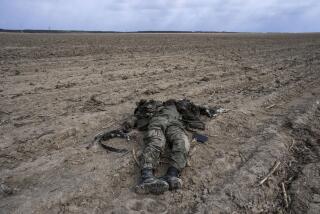13,310 Killed in 8-Year Afghan War, Soviets Say
- Share via
MOSCOW — The Soviet Union, in its first official report on Soviet casualties in the Afghanistan war, announced Wednesday that 13,310 of its soldiers had been killed in more than eight years of fighting in Afghanistan.
In addition, 35,478 soldiers had been wounded and 311 were listed as missing in action at the beginning of May, Gen. Alexei D. Lizichev, chief of the Soviet armed forces’ political department, said at a news conference.
“We are aware of our losses, and those losses have been quite large,” Lizichev said.
Political Sensitivity
Until now, the number of Soviet casualties has been a tightly held military secret because of the increasing political sensitivity to the war. The number of Afghan casualties, military and civilian on both sides of the war, has been put as high as 1 million.
“In any conflict, there are casualties, and we have suffered serious losses,” Lizichev said. “Yet Soviet soldiers are leaving Afghanistan now and returning home with a sense of having fulfilled their internationalist duty to help the Afghan people. They have gone through a heavy test in Afghanistan, but they have shown courage.”
He said that about 9,500 Soviet soldiers had left Afghanistan in the withdrawal that began May 15 and that half of the Soviet forces would be out by Aug. 15, as required by an agreement signed last month by Afghanistan and Pakistan, with the Soviet Union and the United States signing as guarantors.
But Lizichev refused four times to say how many Soviet troops were in Afghanistan as part of Moscow’s “limited military contingent.” Western estimates put the number at 115,000. Nor would Lizichev say how many soldiers had served there since the Soviet Union intervened in late December, 1979.
Western diplomats in Afghanistan and neighboring Pakistan believe the withdrawal is going more slowly than Moscow had hoped because of attacks by the rebel moujahedeen on Afghan government forces that are replacing the Soviet troops and on the departing Soviet convoys themselves.
Faster Rate Required
Soviet military commanders in Afghanistan had said that about a quarter of their troops would be pulled out by the start of the U.S.-Soviet summit meeting Sunday. To achieve that goal would require a much faster rate of withdrawal, however.
Yuli M. Vorontsov, the first deputy foreign minister, hinted that Moscow might reconsider its troop withdrawal plans if Pakistan continues what he called “gross violations” of the Geneva agreement under which the Soviets are leaving.
“If the Geneva agreements are not carried out by the Pakistani side, we will react as the situation demands,” Vorontsov told reporters, deliberately leaving open the possibility when asked whether the withdrawal might be slowed or halted.
Afghanistan has filed four protests with U.N. observers about continued moujahedeen operations from Pakistan and arms shipments to them from Pakistan, Vorontsov said, and the Soviet Union has pressed Pakistan to halt all moujahedeen activities.
‘Oil on the Fire’
Moscow now intends to take up the question during the summit meeting, Vorontsov said, adding that Washington, with its promises of further arms shipments to the Muslim guerrillas, seems to be “pouring oil on the fire” in Afghanistan.
He said Soviet officials will present evidence of the sale of 33 U.S. ground-to-air Stinger missiles by the moujahedeen to Iranian government agents and 10 others to drug smugglers, also in Iran, at an average cost of $300,000 each.
“Perhaps the American public would like to know how some of the U.S. military aid is used,” he said.
Vorontsov said other regional conflicts, including the Middle East and the Persian Gulf War between Iran and Iraq, will also figure prominently in the talks between President Reagan and Mikhail S. Gorbachev, the Soviet leader.
The casualty figures reported by Lizichev were in line with most Western intelligence estimates, which had put the number of dead at 12,000 to 15,000.
Although Soviet casualties in Afghanistan were much lower than those suffered by U.S. forces in Vietnam, proportionately they were about the same over the eight years both wars lasted.
More to Read
Sign up for Essential California
The most important California stories and recommendations in your inbox every morning.
You may occasionally receive promotional content from the Los Angeles Times.













